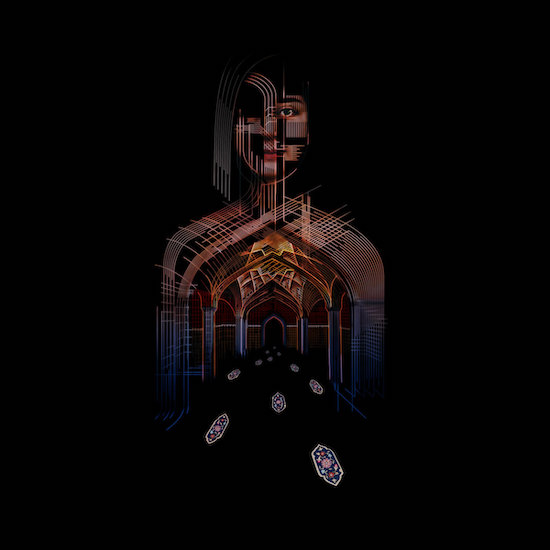It’s reasonably common for artists to begin their career making music which gives little clue about its makers’ background, before going on to explore that in greater detail. German born Ata Ebtekar, who records as Sote, has done this so extensively as to palpably alter the music scene in Iran, where he lives. Not single-handedly – Ebtekar thrives on collaboration, including on Parallel Persia, his 11th studio album – but certainly catalytically; moving back to Tehran from the US in the early part of this decade, discovering an embryonic underground movement of electronic musicians and making this scene-flesh via things like the SET festival.
Sote’s desire to have this modern Iran run headlong into the trad has also spawned Parallel Persia, a seven-track quasi-concept album and his debut for Oscar Powell’s Diagonal label. It’s dazzling and dizzying in its unification of acoustic string instruments and hypermodern digital composition: Arash Bolouri plays the santour, Pouya Damadi the tar, Ebtekar reframes their poignant melodic qualities via technoid landscapes varying from elegantly sparse to furiously complex, often within the same piece. It feels like a tangible succession from Sote’s previous album, 2017’s Sacred Horror In Design, which also featured Bolouri, and a far lighter touch on the producer’s part.
Initially – the opening ‘Modality Transporter’ – this feels like a reprise of that, Damadi’s scales given breathing room and just dusted with some granular digi-fizz. In due course, following the comparably sedate ‘Brass Tacks’, energy levels rocket: ‘Atomic Hypocrisy’ is a heart-attack horror soundtrack where Boulori’s hammered strings are sampled, mirrored by Ebtekar’s synths, then cast into a whirlpool of abstraction. ‘Alpha Terrain Of Disease’ is less gaspworthy in its tonal manoeuvres but no beatific soother, electroacoustic pluck and clang underpinned by drones of an unclear source. If you like the parts of Aphex’s Drukqs between its gabber and Satie-esque extremes, or The Civil War by Matmos, this is likely your kind of sound design.
The only occurrence of vocals, on ‘Pipe Dreams’, creep in subtly – first as a vaguely malevolent chant amidst 4/4 kicks and clockwork beatwork, then more histrionic as motifs sweep hither and yon. Come the album’s closing payoff, ‘Pseudo Scholastic’ (Sote has a nice line in track titles), it’s a kitchen-sinky bricabrac of everything that came before it and then some: if I had access to a club PA I might be able to tell you if the flatulent distortobass that enters after three minutes is a deep-frequency special, a la his one-off 2002 Warp single ‘Electric Deaf’.
Parallel Persia is a hugely impressive creation in and out of social context. It measures up to Rian Trainor’s ATAXIA and Nkisi’s 7 Directions as an early-19 electronic futureshock LP, and affirms that Ata Ebtekar is one of the most significant producers on the planet for anyone invested in upending this music’s Western hegemony.


